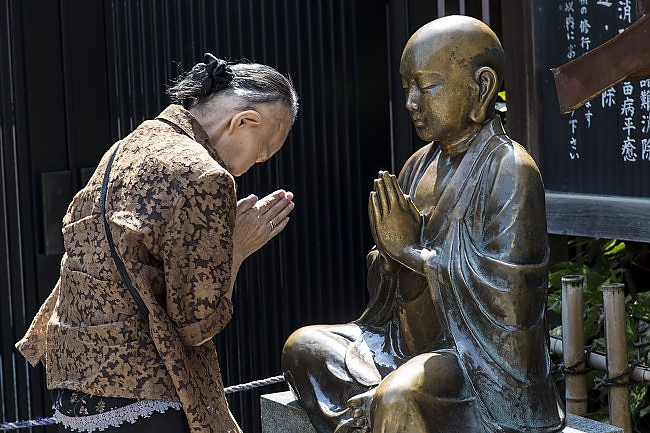When You Greet Me, I Bow: Notes and Reflections from A Life In Zen, by Norman Fischer.
Book Review
Michael Haggiag reviews this title by Norman Fischer, former abbot of the San Fransisco Zen Center, whose writings are marked by a deep insight into issues that Westerners face with Buddhist practice.

Bowing to the Buddha
Norman Fischer is the former abbot of the San Francisco Zen Centre founded by Shunryu Suzuki, the author of the classic Zen Mind, Beginners Mind. His recent book is a collection of essays written over a period of two decades for various American Buddhism publications.
The author is a true child of the Sixties who has engaged in almost every aspect of California life: beat poetry, anti-war protest marches, civil rights, and more recently women’s liberation and the secular mindfulness movement. He is an accomplished poet as well as an activist who is deeply committed to social justice and interfaith dialogue. His essays are marked by honesty, humility and deep insight into the problems Westerners often face as Zen students. Taken together, this collection provides a fascinating look at Zen practice in America and the issues it continues to face.
Bowing, mentioned in the title, can represent a big obstacle for Westerners new to Zen. Why do we bow to the Buddha? Why do we bow at all? Fischer touches fairly lightly on this theme. He describes bowing as an expression of love and respect, but recognizes that some are afraid that bowing will compromise their autonomy and sense of self-worth. He tells the story of his own teacher who pointed out to him that the little Buddha on the altar was also bowing to him: “If he can do it, you can do it!” And yet bowing has a much deeper implication and role to play in Zen practice because it also goes to the heart of our problem: the delusion of “I”,- what I want, what I don’t want, what I can’t bear. Our willfulness runs deep, but egos are fragile and we suffer as soon as we don’t get our way. My own teacher believed that as Westerners we were even more stiff-necked than our Eastern counterparts so we had to bow even lower! She taught us that the only way to lay down this “I” was through the body - by bowing, over and over again.
Fischer concludes the volume by mentioning the three Buddhist precepts: “To avoid evil, to do good, to benefit all beings.” He believes it’s our duty to make the world better through “energy, appreciation, forgiveness, noncondemnation, understanding, and grief.” That last word caught my attention. The Sattipattana sutra, also known as the Four Foundations of Awareness, is a key text for us Zen practitioners. In it the Buddha states repeatedly that his followers must put away “covetousness and grief for the world” before they can even start to be aware. In one of his last essays entitled No Beginning, No End, No Fear, Fischer tries to address this issue directly by drawing a distinction between fear, anguish and anger, and what he calls “the quiet feelings we can live with”: grief, sorrow, and disappointment. These feelings arise in him when his efforts to save the world come to little or nothing, but he says “they can be peaceful and poignant, they can be motivating.” I am more convinced and moved by the superb example he offers of his friend, an environmental activist who has become ever more despairing about climate change. Great forest fires are burning all around them, having devastated California in recent years, but Fischer shrewdly observes that it’s not the only thing that’s bothering him. His friend finally admits: “I am upset about the climate, but what makes me feel this anguish is that I am scared of my aging and dying. The planet really is under threat. And so am I.” And there we have it: Buddha’s original insight, as enduring and relevant today as ever.




